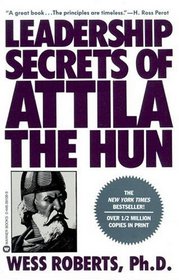Helpful Score: 2
Attila the Hun - the man who centuries ago shaped an aimless band of mercenary tribal nomads into the undisputed rulers of the ancient world and who today offers us timeless lessons in win-directed, take-charge management.
Great title, pop history
Great title, don't you think?
"A MANAGERIAL CULT CLASSIC."--Forbes
This is the book that's got the business world reading, thinking, and quoting. Learn the leadership secrets of Attila the Hun--the man who centuries ago shaped an aimless band of mercenary tribal nomads into the undisputed rulers of the ancient world.
This is the book that's got the business world reading, thinking, and quoting. Learn the leadership secrets of Attila the Hun--the man who centuries ago shaped an aimless band of mercenary tribal nomads into the undisputed rulers of the ancient world.
...a primer on basic management!
This book takes the writings of Attila the Hun, one of the world's most succesful leaders, and applies it to modern business. One would expect it to advise cut-throat methods but they are surprisingly practical in modern life.
This is an excellent leadership book. I recommended to several in our management and they liked it as well.
A rather nifty conceit with the title...
Having made a study of leadership for most of my life, not that I consider myself a great leader, I was very interested in the premise of this book.
What a disappointment! Even in the beginning the author states most of what he is saying Attila 'said' was made up. To quote, "The aphorisms spoken by Attila in this book have no basis of authenticity as ever having been said by the king of the Huns." The author even admits he makes Attila and the Huns look better in this book than they appear in history.
After that, most of the leadership principles he presents are essentially bromides. You can find these in almost every other book on leadership. What got to me, to stop me reading about one-third of the way through the book, was his occasional contradiction of something he stated earlier.
It doesn't surprise me this is a "NY Times bestseller" or that Ross Perot really liked the book. I don't have respect for either. NY Times 'bestsellers' are no longer what they used to be, and as for Perot.... let's not go there.
What is disappointing, but probably not surprising, is this book was considered a great primer on leadership. I take this as a reflection of the current state of leadership in our country.
What a disappointment! Even in the beginning the author states most of what he is saying Attila 'said' was made up. To quote, "The aphorisms spoken by Attila in this book have no basis of authenticity as ever having been said by the king of the Huns." The author even admits he makes Attila and the Huns look better in this book than they appear in history.
After that, most of the leadership principles he presents are essentially bromides. You can find these in almost every other book on leadership. What got to me, to stop me reading about one-third of the way through the book, was his occasional contradiction of something he stated earlier.
It doesn't surprise me this is a "NY Times bestseller" or that Ross Perot really liked the book. I don't have respect for either. NY Times 'bestsellers' are no longer what they used to be, and as for Perot.... let's not go there.
What is disappointing, but probably not surprising, is this book was considered a great primer on leadership. I take this as a reflection of the current state of leadership in our country.
I read this book when it first came out - and I still have Attila the Hun leadership mottos tacked up to remind me of the truths in this book:
Attila on "Doing The Right Thing"
The deepest scars a Hun bears are not those of the body, but rather of the soul. And wounds to the body heal faster and more thoroughly than those inflicted on the soul.
Attila on "Courage"
For Huns, every good and excellent thing they can accomplish carries within it the potential for failure.
Attila on "Problem Solving"
Chieftains who live only to solve problems become martyrs, and death comes slowly for them.
Attila on "Doing The Right Thing"
The deepest scars a Hun bears are not those of the body, but rather of the soul. And wounds to the body heal faster and more thoroughly than those inflicted on the soul.
Attila on "Courage"
For Huns, every good and excellent thing they can accomplish carries within it the potential for failure.
Attila on "Problem Solving"
Chieftains who live only to solve problems become martyrs, and death comes slowly for them.




